牛津译林版英语八年级下Unit 6 Sunshine for all课件(18张PPT)
文档属性
| 名称 | 牛津译林版英语八年级下Unit 6 Sunshine for all课件(18张PPT) | 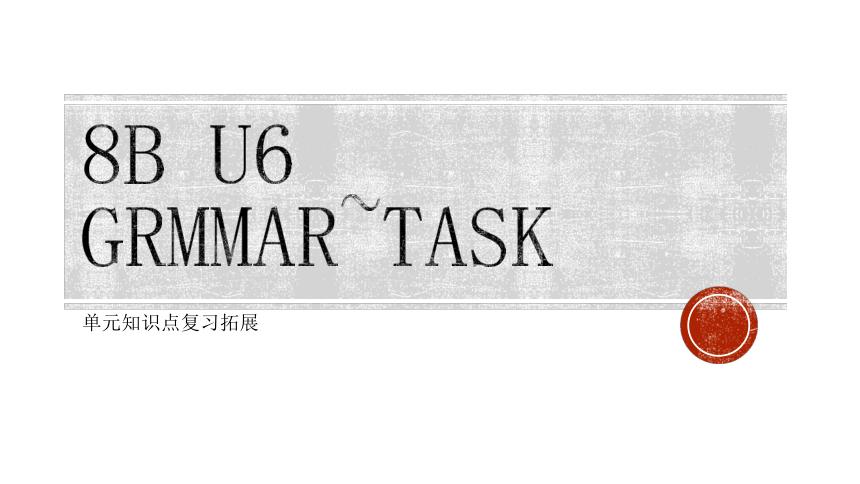 | |
| 格式 | pptx | ||
| 文件大小 | 396.3KB | ||
| 资源类型 | 教案 | ||
| 版本资源 | 牛津译林版 | ||
| 科目 | 英语 | ||
| 更新时间 | 2022-04-28 11:23:24 | ||
图片预览



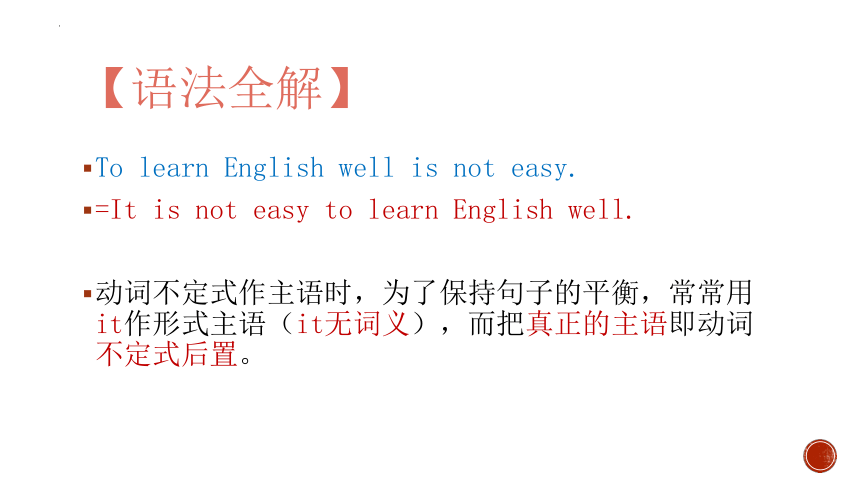
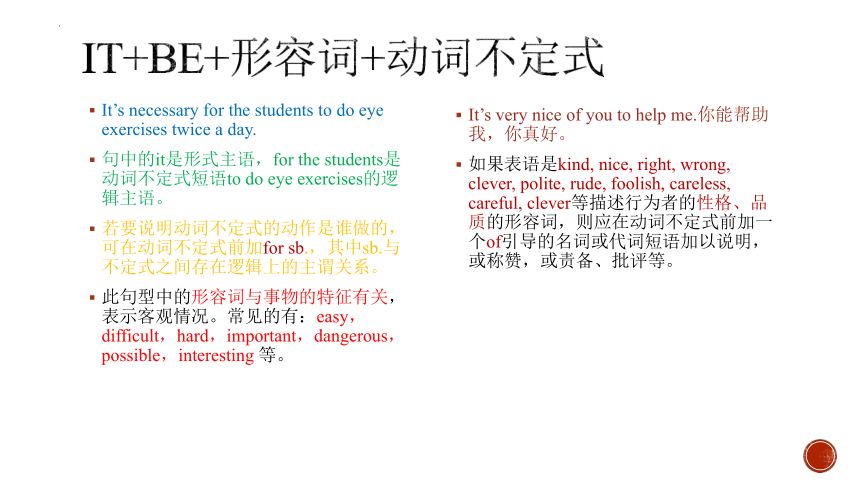
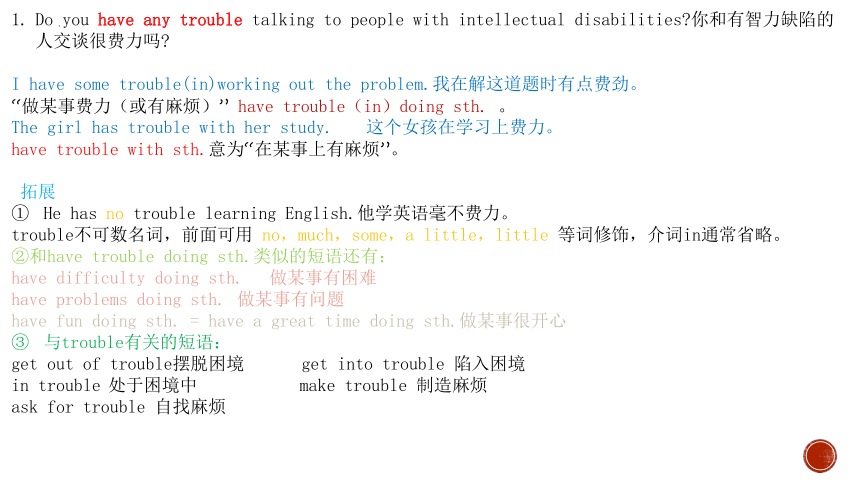
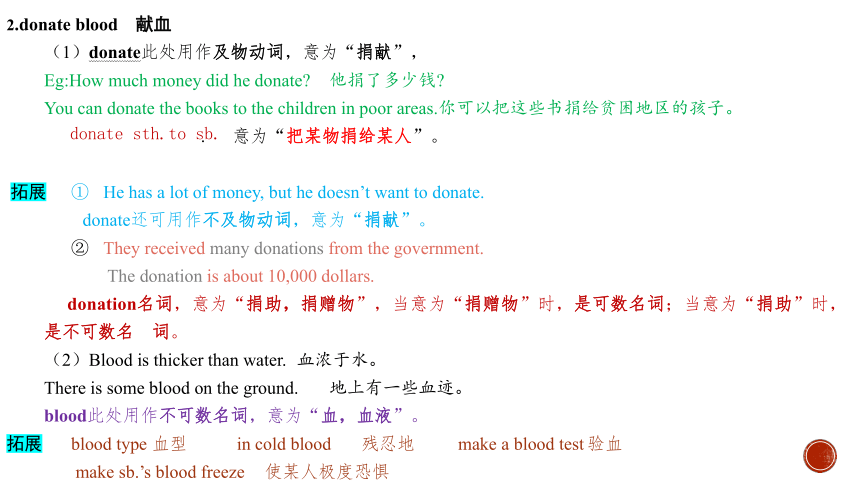
文档简介
(共18张PPT)
8b u6 grmmar~task
单元知识点复习拓展
grammar
1. It is meaningful to do something for the Olympics.为奥运会做些儿事情是很有意义的。
2. It was very brave of him to join the competition.对他来说参加这项比赛是很有勇气的。
3. It is great for us to work closely with these special athletes.能和这些特殊运动员们近距离共事真的很棒。
上面1、2、3句中it是形式主语,动词不定式是真正的主语。今天,我们一起来学习动词不定式作主语的用法。
【教材典句】
【语法全解】
To learn English well is not easy.
=It is not easy to learn English well.
动词不定式作主语时,为了保持句子的平衡,常常用it作形式主语(it无词义),而把真正的主语即动词不定式后置。
it+be+形容词+动词不定式
It’s necessary for the students to do eye exercises twice a day.
句中的it是形式主语,for the students是动词不定式短语to do eye exercises的逻辑主语。
若要说明动词不定式的动作是谁做的,可在动词不定式前加for sb.,其中sb.与不定式之间存在逻辑上的主谓关系。
此句型中的形容词与事物的特征有关,表示客观情况。常见的有:easy,difficult,hard,important,dangerous,possible,interesting 等。
It’s very nice of you to help me.你能帮助我,你真好。
如果表语是kind, nice, right, wrong, clever, polite, rude, foolish, careless, careful, clever等描述行为者的性格、品质的形容词,则应在动词不定式前加一个of引导的名词或代词短语加以说明,或称赞,或责备、批评等。
Do you have any trouble talking to people with intellectual disabilities 你和有智力缺陷的人交谈很费力吗
I have some trouble(in)working out the problem.我在解这道题时有点费劲。
“做某事费力(或有麻烦)” have trouble(in)doing sth. 。
The girl has trouble with her study. 这个女孩在学习上费力。
have trouble with sth.意为“在某事上有麻烦”。
拓展
① He has no trouble learning English.他学英语毫不费力。
trouble不可数名词,前面可用 no,much,some,a little,little 等词修饰,介词in通常省略。
②和have trouble doing sth.类似的短语还有:
have difficulty doing sth. 做某事有困难
have problems doing sth. 做某事有问题
have fun doing sth. = have a great time doing sth.做某事很开心
③ 与trouble有关的短语:
get out of trouble摆脱困境 get into trouble 陷入困境
in trouble 处于困境中 make trouble 制造麻烦
ask for trouble 自找麻烦
2.donate blood 献血
(1)donate此处用作及物动词,意为“捐献”,
Eg:How much money did he donate 他捐了多少钱
You can donate the books to the children in poor areas.你可以把这些书捐给贫困地区的孩子。
. 意为“把某物捐给某人”。
拓展 ① He has a lot of money, but he doesn’t want to donate.
donate还可用作不及物动词,意为“捐献”。
② They received many donations from the government.
The donation is about 10,000 dollars.
donation名词,意为“捐助,捐赠物”,当意为“捐赠物”时,是可数名词;当意为“捐助”时,是不可数名 词。
(2)Blood is thicker than water. 血浓于水。
There is some blood on the ground. 地上有一些血迹。
blood此处用作不可数名词,意为“血,血液”。
拓展 blood type 血型 in cold blood 残忍地 make a blood test 验血
make sb.’s blood freeze 使某人极度恐惧
donate sth.to sb.
integrated skills
South-west China专有名词,意为“中国西南地区”。
He lives in South-west China.他住在中国西南地区。
拓展
①A warm south-west wind was blowing.
south-west可用作形容词,意为“西南方的”。
②The house faces the south-west.
south-west还可用作名词,意为“西南方”,常与定冠词 the 连用。
③ The window faces south-west.
south-west还可作副词,意为“向西南”。
1. South-west China. 中国西南地区。
2.In this way, they can help the local people improve their lives.用这种方式,他们可以帮助当地的人们改善他们的生活。
in this way 意为“这样,以这种方式”。
You can’t do it in this way. It’s wrong.
拓展 In a way, you’re right.
in a way意为“在某种程度上”。
3. We can save our pocket money and donate it to those in need.我们可以省下零花钱把它捐给需要帮助的人。
(1)save及物动词,意为“节省”。
拓展
A young man saved the little boy from drowning.
He had to save money to buy anew bike.
save及物动词,还可意为“储存;救;挽救”。
(2)in need为固定短语,表示“处于需要的状态”,在本句中修饰those。
He is homeless and in need of help.
in need of...意为“需要……”。
study skills
However, we can organize our ideas in different ways according to the type of writing. 然而,我们可以根据写作类型用不同的方式组织我们的想法。
According to the story,write a report.
According to Tom, this is not a good plan.
according to意为“根据,按照……所说”,to为介词,其后接名词或代词。
注意 according to用来引出来自他人或他处的消息,不能与opinion和view等连用。
2.We use this method when we want to use some specific examples to lead to our main ideas. 当我们想用一些详细事例导入主题思想时,用这个方法。
Smoking can lead to lung cancer.
An ordinary cold can soon lead to a fever.
lead to意为“导致,引起,通向”,其中to为介词,后跟名词或代词。
task
The doctor says that he has a serious blood disease. 医生说他得了一种严重的血液病。
He was born with a heart disease.
disease此处为可数名词,意为“疾病”。
辨析 disease,illness与sickness
The city was very dirty.As a result, there were many diseases.
Because of illness, she didn’t go to school.
Rough seas caused much sickness among the passengers.
disease,病,疾病。通常指具体的“疾病”,此时为可数名词;有时指疾病的总称,此时为不可数名词。
illness,病。很少指具体的疾病,只表示抽象的疾病和生病的状态。
sickness,可泛指身体不适,还特指呕吐、晕船、晕车等。
2.An operation may save him...手术可能会挽救他……
operation可数名词,意为“手术”。
He had an operation on his head. 他头部动了手术。
Does the old man have an operation 这位老人动手术
意为“给某人做手术”。
,意为“某个身体部位接受手术”
,意为“某人动手术”
拓展
The doctors decided to operate on him for the tumor/ tju m (r)/. 肿瘤 …
operate on sb. for…因…为某人做手术
The machine is in operation.
operation还可用作不可数名词,意为“运转,操作”,in operation意为“运转中,操作中,实施中”。
do an operation on sb.
have an operation on+身体部位
sb. have an operation
3.Otherwise, he may lose his life. 否则,他可能失去生命。
lose one’s life意为“失去生命,丧生”。
拓展
Don’t lose heart. You’ll learn English well.
① lose heart 灰心丧气。
He lost himself in reading.
② lose oneself 沉湎于。
The boy lost his way and cried on the street.
③ lose one’s way 迷路,相当于get lost。
4. If all of us can give a helping hand, he may get well again soon. 如果我们所有人都能伸出援助之手,他可能会很快重新好起来。
give a helping hand意为“帮助,伸出援助之手”。
Many people gave a helping hand when they saw the poor man.
当看到这个可怜的人时,很多人伸出了援助之手。
拓展
do sb. a favour 帮某人个忙 ask a favour of sb. 请某人帮忙
give sb. a hand 帮某人一把
thank you!
8b u6 grmmar~task
单元知识点复习拓展
grammar
1. It is meaningful to do something for the Olympics.为奥运会做些儿事情是很有意义的。
2. It was very brave of him to join the competition.对他来说参加这项比赛是很有勇气的。
3. It is great for us to work closely with these special athletes.能和这些特殊运动员们近距离共事真的很棒。
上面1、2、3句中it是形式主语,动词不定式是真正的主语。今天,我们一起来学习动词不定式作主语的用法。
【教材典句】
【语法全解】
To learn English well is not easy.
=It is not easy to learn English well.
动词不定式作主语时,为了保持句子的平衡,常常用it作形式主语(it无词义),而把真正的主语即动词不定式后置。
it+be+形容词+动词不定式
It’s necessary for the students to do eye exercises twice a day.
句中的it是形式主语,for the students是动词不定式短语to do eye exercises的逻辑主语。
若要说明动词不定式的动作是谁做的,可在动词不定式前加for sb.,其中sb.与不定式之间存在逻辑上的主谓关系。
此句型中的形容词与事物的特征有关,表示客观情况。常见的有:easy,difficult,hard,important,dangerous,possible,interesting 等。
It’s very nice of you to help me.你能帮助我,你真好。
如果表语是kind, nice, right, wrong, clever, polite, rude, foolish, careless, careful, clever等描述行为者的性格、品质的形容词,则应在动词不定式前加一个of引导的名词或代词短语加以说明,或称赞,或责备、批评等。
Do you have any trouble talking to people with intellectual disabilities 你和有智力缺陷的人交谈很费力吗
I have some trouble(in)working out the problem.我在解这道题时有点费劲。
“做某事费力(或有麻烦)” have trouble(in)doing sth. 。
The girl has trouble with her study. 这个女孩在学习上费力。
have trouble with sth.意为“在某事上有麻烦”。
拓展
① He has no trouble learning English.他学英语毫不费力。
trouble不可数名词,前面可用 no,much,some,a little,little 等词修饰,介词in通常省略。
②和have trouble doing sth.类似的短语还有:
have difficulty doing sth. 做某事有困难
have problems doing sth. 做某事有问题
have fun doing sth. = have a great time doing sth.做某事很开心
③ 与trouble有关的短语:
get out of trouble摆脱困境 get into trouble 陷入困境
in trouble 处于困境中 make trouble 制造麻烦
ask for trouble 自找麻烦
2.donate blood 献血
(1)donate此处用作及物动词,意为“捐献”,
Eg:How much money did he donate 他捐了多少钱
You can donate the books to the children in poor areas.你可以把这些书捐给贫困地区的孩子。
. 意为“把某物捐给某人”。
拓展 ① He has a lot of money, but he doesn’t want to donate.
donate还可用作不及物动词,意为“捐献”。
② They received many donations from the government.
The donation is about 10,000 dollars.
donation名词,意为“捐助,捐赠物”,当意为“捐赠物”时,是可数名词;当意为“捐助”时,是不可数名 词。
(2)Blood is thicker than water. 血浓于水。
There is some blood on the ground. 地上有一些血迹。
blood此处用作不可数名词,意为“血,血液”。
拓展 blood type 血型 in cold blood 残忍地 make a blood test 验血
make sb.’s blood freeze 使某人极度恐惧
donate sth.to sb.
integrated skills
South-west China专有名词,意为“中国西南地区”。
He lives in South-west China.他住在中国西南地区。
拓展
①A warm south-west wind was blowing.
south-west可用作形容词,意为“西南方的”。
②The house faces the south-west.
south-west还可用作名词,意为“西南方”,常与定冠词 the 连用。
③ The window faces south-west.
south-west还可作副词,意为“向西南”。
1. South-west China. 中国西南地区。
2.In this way, they can help the local people improve their lives.用这种方式,他们可以帮助当地的人们改善他们的生活。
in this way 意为“这样,以这种方式”。
You can’t do it in this way. It’s wrong.
拓展 In a way, you’re right.
in a way意为“在某种程度上”。
3. We can save our pocket money and donate it to those in need.我们可以省下零花钱把它捐给需要帮助的人。
(1)save及物动词,意为“节省”。
拓展
A young man saved the little boy from drowning.
He had to save money to buy anew bike.
save及物动词,还可意为“储存;救;挽救”。
(2)in need为固定短语,表示“处于需要的状态”,在本句中修饰those。
He is homeless and in need of help.
in need of...意为“需要……”。
study skills
However, we can organize our ideas in different ways according to the type of writing. 然而,我们可以根据写作类型用不同的方式组织我们的想法。
According to the story,write a report.
According to Tom, this is not a good plan.
according to意为“根据,按照……所说”,to为介词,其后接名词或代词。
注意 according to用来引出来自他人或他处的消息,不能与opinion和view等连用。
2.We use this method when we want to use some specific examples to lead to our main ideas. 当我们想用一些详细事例导入主题思想时,用这个方法。
Smoking can lead to lung cancer.
An ordinary cold can soon lead to a fever.
lead to意为“导致,引起,通向”,其中to为介词,后跟名词或代词。
task
The doctor says that he has a serious blood disease. 医生说他得了一种严重的血液病。
He was born with a heart disease.
disease此处为可数名词,意为“疾病”。
辨析 disease,illness与sickness
The city was very dirty.As a result, there were many diseases.
Because of illness, she didn’t go to school.
Rough seas caused much sickness among the passengers.
disease,病,疾病。通常指具体的“疾病”,此时为可数名词;有时指疾病的总称,此时为不可数名词。
illness,病。很少指具体的疾病,只表示抽象的疾病和生病的状态。
sickness,可泛指身体不适,还特指呕吐、晕船、晕车等。
2.An operation may save him...手术可能会挽救他……
operation可数名词,意为“手术”。
He had an operation on his head. 他头部动了手术。
Does the old man have an operation 这位老人动手术
意为“给某人做手术”。
,意为“某个身体部位接受手术”
,意为“某人动手术”
拓展
The doctors decided to operate on him for the tumor/ tju m (r)/. 肿瘤 …
operate on sb. for…因…为某人做手术
The machine is in operation.
operation还可用作不可数名词,意为“运转,操作”,in operation意为“运转中,操作中,实施中”。
do an operation on sb.
have an operation on+身体部位
sb. have an operation
3.Otherwise, he may lose his life. 否则,他可能失去生命。
lose one’s life意为“失去生命,丧生”。
拓展
Don’t lose heart. You’ll learn English well.
① lose heart 灰心丧气。
He lost himself in reading.
② lose oneself 沉湎于。
The boy lost his way and cried on the street.
③ lose one’s way 迷路,相当于get lost。
4. If all of us can give a helping hand, he may get well again soon. 如果我们所有人都能伸出援助之手,他可能会很快重新好起来。
give a helping hand意为“帮助,伸出援助之手”。
Many people gave a helping hand when they saw the poor man.
当看到这个可怜的人时,很多人伸出了援助之手。
拓展
do sb. a favour 帮某人个忙 ask a favour of sb. 请某人帮忙
give sb. a hand 帮某人一把
thank you!
